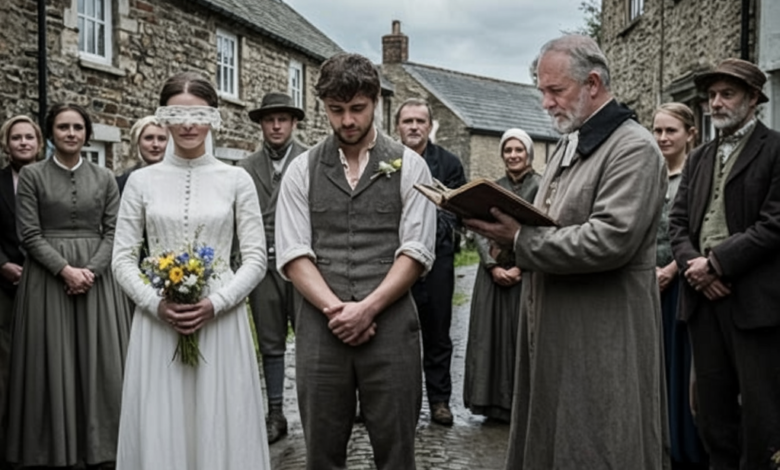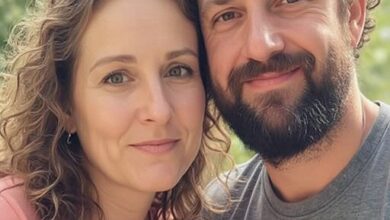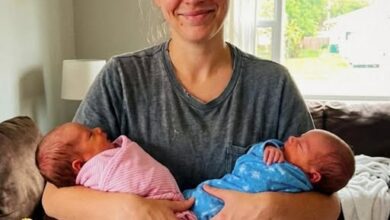
HER FATHER MARRIED HER TO A BEGGAR BECAUSE SHE WAS BORN BLIND AND THIS HAPPENED!
Zainab had never seen the world, yet she felt its cruelty with every breath. Born blind into a family obsessed with beauty, she was marked as different from the start. Her sisters were admired for their sparkling eyes and graceful figures, while she was hidden away, treated as a burden, a secret that brought shame. Her mother’s death when Zainab was five only deepened her isolation. Her father, once stern but fair, hardened into someone bitter and cruel. He stopped calling her by name, referring to her only as “that thing.” He refused to let her sit at the family table or greet guests, keeping her out of sight as though she were a curse. For years, Zainab wondered if he might be right—if her blindness made her unworthy of love or dignity.
On her twenty-first birthday, her father shattered what was left of her fragile hope. He entered her small room without warning, dropped a folded piece of cloth into her lap, and said in a flat, detached voice, “You’re getting married tomorrow.” Zainab’s heart stopped. Married? To whom? She searched his tone for some kindness, some explanation, but found none. His next words were sharper than knives. “He’s a beggar from the mosque. You are blind, he is poor. A good match.” He didn’t ask her opinion. He didn’t care.
The wedding was small and rushed, more like a transaction than a celebration. She never saw her husband’s face, nor did anyone bother to describe it to her. Her father shoved her toward the man and commanded her to take his arm. Guests whispered behind their hands, mocking: “The blind girl and the beggar.” Afterward, her father thrust a small bag of clothes into her hands and said coldly, “Now you’re his problem,” before walking away without looking back.
The beggar’s name was Yusha. He led her silently down a dirt road to a crumbling hut at the edge of the village. The air smelled of damp earth and smoke. “It’s not much,” he said softly, “but you’ll be safe here.” Zainab sat on a frayed rug, fighting tears. This was her new life: a blind girl married to a beggar, forgotten in a mud hut. Yet something unexpected happened that very night.
Yusha brewed tea with gentle care. He draped his coat over her shoulders and lay by the door as though guarding her. He asked her what she liked, what she dreamed of, what foods made her smile. No one had ever asked her these things. The days that followed began to soften her grief. Each morning, he guided her to the river, describing the sunrise, the colors of the birds, the way the wind moved through the trees. At night, he sang and told her stories of distant lands and star-filled skies so vividly she felt she could almost see them. For the first time in years, Zainab laughed. Slowly, she began to love.
Still, one question haunted her. One evening she asked carefully, “Were you always a beggar?” He hesitated, then answered quietly, “I wasn’t always like this.” But he said no more, and she didn’t press.
Weeks later, while walking to the market alone with directions Yusha had taught her, she was grabbed roughly by the arm. A cruel voice spat, “Blind rat!” It was her sister Aminah. “Still alive? Still playing wife to a beggar?” Zainab stood her ground. “I am happy,” she said firmly. Aminah laughed bitterly. “Happy? You don’t even know what he looks like. He isn’t a beggar at all. You’ve been lied to.”
The words struck like thunder. Shaken, Zainab returned home and waited. That night, when Yusha entered, she confronted him. “Tell me the truth. Who are you?”
Yusha knelt, taking her hands. His voice trembled. “I can’t lie anymore. I’m not a beggar. I am the son of the Emir.”
Zainab’s world tilted. She pulled back, breathless. “Why would you deceive me?”
His answer came with quiet intensity. “Because I wanted someone who saw me, not my wealth or my title. I disguised myself and watched you for weeks. I knew your father would agree only if he thought I was worthless. But you… you loved me for who I am, not what I own. That’s all I ever wanted.”
Tears spilled down her cheeks. Her father had cast her aside in cruelty, yet this man had chosen her deliberately. Her voice shook. “And now?”
“Now you come with me to the palace,” Yusha said, holding her hand.
She hesitated. “But I’m blind. How can I be a princess?”
“You already are,” he whispered.
The next morning, a royal carriage arrived at their hut. Guards in black and gold bowed to Yusha. Villagers gaped as Zainab, blind but unbroken, stepped into the carriage beside him. At the palace gates, crowds gathered in astonishment. Yusha declared proudly, “This is my wife, the woman who saw my soul when no one else could.”
The Queen studied Zainab carefully, then embraced her. “Then she is my daughter.” Relief flooded Zainab as Yusha’s grip tightened around hers. She was no longer unwanted.
Life in the palace, however, was not free of challenges. Nobles whispered about the “blind princess,” some mocking her, others doubting her place. Shadows of her father’s rejection echoed in her mind. But Zainab, having endured cruelty all her life, refused to shrink. She walked into the court with her head high, listened to the nobles’ concerns, and spoke with calm wisdom. Her insight, sharpened by years of listening and observing with her other senses, won respect slowly but surely.
One day, Yusha shocked the court when he stood before them and declared, “I will not take the crown unless my wife is honored here. If she is not accepted, then I will leave with her.” Gasps rippled through the chamber. Zainab clutched his hand, whispering, “Would you really give up the throne?”
“I already gave it up once,” he said. “I would do it again.”
The Queen rose, silencing the room. “From this day, Zainab is Princess of the Royal House. Any who dishonor her dishonor the crown itself.”
From then on, no one dared mock her. Over time, Zainab transformed the court—not with wealth or power, but with kindness and conviction. She mediated disputes, advised on policies, and became beloved by commoners who saw in her a queen who understood suffering. Her blindness, once her curse, became her strength. She could not be fooled by appearances; she listened deeper, judged fairly, and loved truly.
Years later, when she walked through the palace gardens, children laughed as they played nearby, calling her “Mother Zainab.” She smiled, her heart full. She had been cast aside, forced into what seemed like a cruel marriage, only to discover love and purpose greater than she had ever imagined.
Zainab had once been hidden in darkness, dismissed as nothing. But she had risen, not only as a wife, not only as a princess, but as a queen of her own destiny. She had proved to herself and to the world that true worth is not in sight or beauty, but in courage, compassion, and the ability to love when the world offers none.
And when Yusha looked at her even decades later, his words never changed: “You saw me when no one else did. And that’s why, blind or not, you will always be the light of this kingdom




